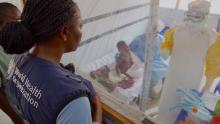Why I chose to help: A doctor from Guinea on why she volunteered for the DRC Ebola crisis
On 24 July 2018, the Ministry of Health of the Democratic Republic of the Congo (DRC) declared the end of the ninth outbreak of Ebola virus disease (over the past four decades) in the country. With the first of 54 total cases reported in May 2018 in Équateur Province, the outbreak was contained quickly, but not before 33 persons had died, including two of the seven health care workers who became infected.
Dr Marie-Claire Kolie, a doctor in Guinea, worked with the World Health Organization when her country (along with Liberia and Sierra Leone) was affected by the most widespread outbreak of Ebola virus disease in history, which began in 2013 and continued until 2016 and led to the death of more than 11 000 people and major socioeconomic disruption in the West African region. When the ninth outbreak occurred in North Kivu Province of the DRC, Dr Kolie volunteered to work there with WHO. Before her posting had ended, a tenth outbreak was declared and she stayed to continue helping.
North Kivu is among the most populated provinces of the DRC, with eight million inhabitants. It shares borders with four other provinces as well as with Uganda and Rwanda. The subregion also has been experiencing intense insecurity and worsening humanitarian crisis, with more than one million internally displaced persons and a continuous outflow of refugees to the neighbouring countries, including Uganda, Burundi and Tanzania. As of early April, 1 154 Ebola virus disease cases (1 088 confirmed and 66 probable cases) had been reported. A total of 731 deaths have been reported. Of the confirmed and probable cases, 57% (662) are female, and 29% (331) are children younger than 18 years. The number of health care workers affected has risen to 85, including 30 deaths.
I knew I had to do something to help my brothers and sisters in the Democratic Republic of the Congo [DRC] when Ebola virus disease broke out.
As a doctor and having worked with the World Health Organization [WHO] when Ebola broke out in my home country of Guinea, I felt that my skills and my experience were needed.
I volunteered to come to the DRC at the beginning of the outbreak in Équateur Province, in June 2018. When another outbreak occurred in North Kivu in August, I knew my work was not done.
Since January 2019, I have been in Butembo, where most of the Ebola cases are currently found. I share a house with other colleagues who also came here to help.
There are many aspects to responding to the Ebola outbreak, and what I do is to provide the link between the clinical management team and other involved parties. This entails transport logistics and the efficient supply of medicines and other essentials. But if we are short on staff, I step into personal protective equipment and treat patients.
My day starts at 05:30. I shower and do breakfast by 06:30 and arrive to the Ebola Treatment Centre thereafter.
On a normal day, I start work by attending coordination meetings. But today, I was too anxious to get to the Ebola Treatment Centre before anything else. There is a patient – a 22-year-old woman – who was struggling last night, and I wanted to check on her. When patients are seriously ill, I spend all night worrying about them. Luckily, she is still alive and under the care of WHO-trained doctors.
Later in the day, I met with the doctors to discuss the state of the patients, so we all get a chance to share experiences and learn from one another. I listened to their needs and challenges and helped make adjustments. For example, a while ago, we took the decision to hire a nutritionist who will ensure appropriate food quality for the patients. This afternoon, the doctors asked me to improve ambulance response times as well as provide paediatric arm bands. I will follow up with the logistics team to make sure these requests are met.
I have to say, I am very proud of the quality of care we’re able to provide here, and I attribute this to the dedication and professionalism of doctors and all other teams supporting us.
Here, no two days are ever the same. Each one brings new challenges and learning. It is intense, and by the time I return to my room in the evening, I am very tired.
I have two daughters, one aged 5 and the other 11, and an 8-year-old son. I call them every two days, and it is something that we all look forward to. It was not easy to leave them at home, but they understand their mother has an important job to do here.
WHO communications consultant
Email: jkisaid [at] gmail.com
Tel: +254 791 197 454 (Whatsapp)
Emergency Communications Officer
Tel : +243 81 715 1697
Office : +47 241 39 027
Email: kabambie [at] who.int




